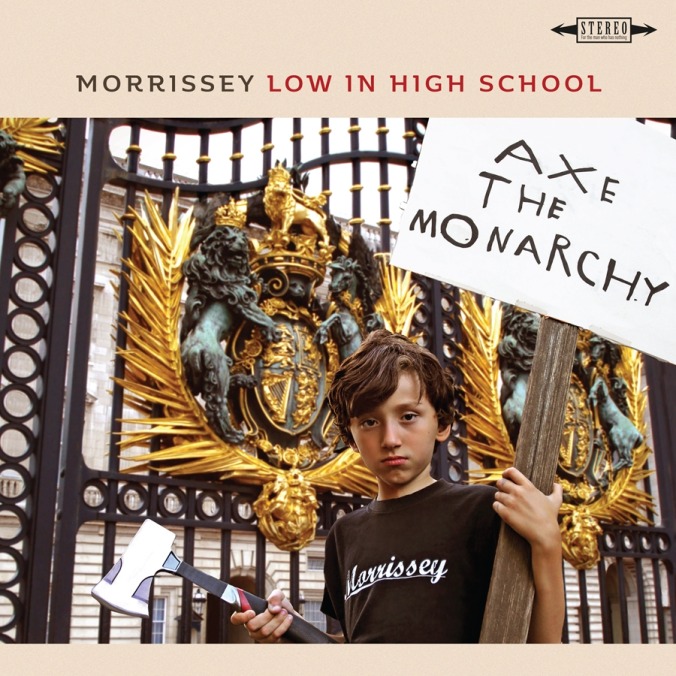Morrissey still has some fight left in him on Low In High School

Morrissey hasn’t made it easy to be a Morrissey fan in recent years, delivering multiple foot-in-mouth political proclamations, a puzzling debut novel, and sporadic, underwhelming new music. 2014’s World Peace Is None Of Your Business felt like a death knell—a listless, uninspired album that veered from attempted bear-poking (voting is useless!) to a song detailing the evils of bullfighting, that most common and relatable of pop music subjects. He seemed to be out of both ideas and the energy with which to deliver them convincingly, not to mention out of touch with the emotions that powered his best songs. The lyricist who made his name by putting the perfect words to life’s most delicate moments in The Smiths and in his strong early solo career wasn’t coasting—he was deflating. Part of the slide was due to Morrissey’s headlong foray into political statement-making, which was in full force from the album title right down the line. The bar for his new one, Low In High School, was so low as to be practically underground.
He’s managed to claw himself out of that hole, bouncing back with what might be his best album since 2004’s You Are The Quarry. And though it doesn’t match Morrissey’s achievements from, let’s say, 1982 until 1994, that’s also not really a fair hurdle to expect him to climb. He’s older now, and still a clever swine, but he’s far removed from the groundbreaking, landscape-changing angry young man that helped shape a musical movement. Instead of your lonely, romantic proxy, he’s your surly, sometimes cool uncle who’s set in his ways but still capable of surprises. Low In High School has a few of those, most effectively on the mid-album epic “I Bury The Living.” It’s a politically incorrect provocation that’s going to get him in some trouble, because it forcefully dismisses the idea of “supporting the troops.” Instead, it indicts all soldiers as murderers with lines like, “Call me brave, call me a peacemaking hero / Call me anything / Except what I am.” Regardless of whether you agree with that sentiment, Morrissey hasn’t sounded this convinced of anything in years, and his expert band—though its arrangements sometimes edge toward show tunes—helps him make his dramatic case. This particular gang of his tends to be a talented one-trick pony, but it stretches itself on this one, moving from a cathartic crash to a pretty little coda that feels like Morrissey in a nutshell: sad, cutting, and pointed.
The political landmines don’t stop there, but neither are they anywhere near as strong: “Who Will Protect Us From The Police?” is an obvious statement, obviously delivered, and “Israel” is a muddle of positive sentiment about the country that’s embraced Morrissey. (If there’s anything Morrissey reacts well to, it’s being reacted to well. He might share that—though surely not much else—with the president of the United States.)
He fares much better when he’s mixing politics and his personal life: “In Your Lap” describes the Arab Spring, but ends up distracted by sex. “They tried to wipe us clean off the map / And I just want my face in your lap,” he sings over melodramatic, soap opera piano. On “Spent The Day In Bed,” he’s more interested in self-care, and while “Spent the day in bed / Very happy I did” is a fine line, it’s no “Spending warm summer days indoors / Writing frightening verse to a buck-toothed girl in Luxembourg.” (Still, the song plays better in context of the album than it did as a single.) And “Home Is A Question Mark” is vintage Moz in both its sentiment and sound: It’s about loneliness, but it may also be about another of his favorite subjects—trouble with record labels. That shouldn’t surprise his fans, who are familiar with—and forgiving of—their hero’s set-in ways. What might surprise those who’ve been paying close attention is Low In High School’s relative strength after such a long, fallow stretch.
Purchasing Low In High School via Amazon helps support The A.V. Club.